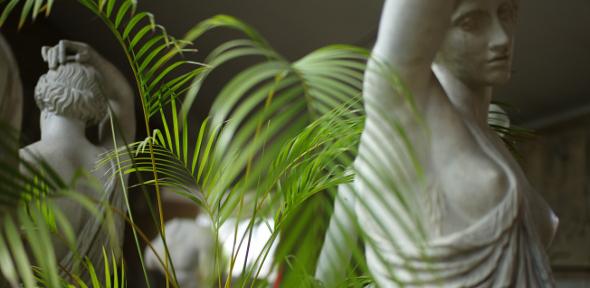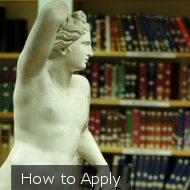
The PhD is a three-year research degree, examined by a dissertation of up to 80,000 words. The criteria for obtaining the degree are that the dissertation represents a 'substantial contribution to knowledge', and that it also represents a realistic amount of work for three years' study.
 Candidates work closely with their supervisor, a senior member of the Classics Faculty (see the list of Faculty members and their research interests), and also have a secondary supervisor. The secondary supervisor is involved in the registration process which must be completed by all students in their first year, and the annual review of progress thereafter; s/he may be consulted more often, if desired, for informal advice.
Candidates work closely with their supervisor, a senior member of the Classics Faculty (see the list of Faculty members and their research interests), and also have a secondary supervisor. The secondary supervisor is involved in the registration process which must be completed by all students in their first year, and the annual review of progress thereafter; s/he may be consulted more often, if desired, for informal advice.
Doctoral students spend most of their time working independently, researching their own specialist topic, but there is a wide variety of postgraduate seminars offered in the various subject areas (Greek and Latin Literature, Philosophy, History, Art and Archaeology, Philology and Linguistics, and Interdisciplinary Approaches to the Ancient World), and you will be encouraged to participate actively in one or more each term. If you need to acquire any further specialist skills, you will be entitled to attend any lectures you wish from the University's extensive undergraduate lecturing programme, in Classics or any other discipline; and the Faculty currently offers training in palaeography, epigraphy, Linear B and numismatics, and classes in a range of ancient and modern languages.
When you have submitted your thesis, it will be examined jointly by two experts in the relevant area, one of them from Cambridge, one from another university, and discussed orally at a viva with the two examiners. Many successful theses go on to become the basis for significant publications.
Course requirements
First Degree: Most applicants will be taking, or have completed, a Master’s level degree course (MPhil, MSt, MA, or other research preparation programme), and we are looking for a first class/Distinction level of work on that course from a British university, or the equivalent from an overseas university.
Your qualification need not be entirely in classical subjects, but we normally expect some evidence of first-class/Distinction level attainments in areas directly relevant to your proposed research.
English Language: If English is not your first language, you will also need to satisfy the Faculty’s English language condition (as follows) prior to your admission being confirmed. You must achieve the minimum requirements in the same sitting, and no more than two years before the start of your course.
- IELTS: Overall band score of 7.5, with not less than 7.0 in individual elements.
- CAE (Cambridge English Advanced): A grade (plus an assessment by our language centre)
- CPE (Cambridge English: Proficiency): A or B grade
- TOEFL: Overall score of 110, with not less than 25 in individual elements.
This condition is waived if you have:-
- completed a course equivalent to a UK Bachelor's degree;
- running for three years or more;
- at an English-language institution;
- in the last two years.
For full information, please refer to the University website.
Greek & Latin: The majority of research projects, with the exception of those which are strictly archaeological in character, require a high level of Latin and/or Greek. The skills which you need to strengthen during your first year can include these languages, but it is unlikely that these could reach the high linguistic standards required for the PhD if you did not arrive here with at least a good grounding in them.
